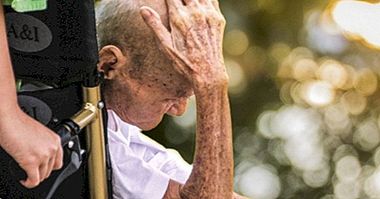Types of ADHD (characteristics, causes and symptoms)
We have all heard about ADHD. Attention Deficit Hyperactivity Disorder is a psychological disorder that seems to be in fashion in recent times: more and more children go from "being nervous" to being diagnosed with this psychopathology.
There are many professionals who have raised their voices and warned that perhaps we are abusing this diagnosis too much, but the objective of this article is not to question this issue, but simply define ADHD and detail the criteria to detect it . We will also emphasize and xplicar the two types of ADHD .

What is Attention Deficit Hyperactivity Disorder?
Abbreviations ADHD mean Attention Deficit Hyperactivity Disorder . It is characterized by severe hyperactivity, impulsivity and inattention.
It is often associated with other disorders such as defiant, behavioral or reading difficulties, it is usually accompanied and detected, due to difficulties in school performance or conflicts in the family environment or with friends.
Studies of families, adoptions and twins seem to corroborate the importance of the genetic factor in this disorder.
Types of ADHD and their characteristics
There are two types of ADHD:
- With a predominance of attention deficit
- With predominance of hyperactivity-impulsivity
Next you have the symptoms associated with each of these subtypes, but bear in mind that to diagnose ADHD, these symptoms must persist for at least 6 months with a maladaptive intensity and incoherent in relation to the level of development, and that at least six of the following symptoms described in the DSM-5 diagnostic manual must occur.
1. ADHD Overlook
- Frequently does not pay enough attention to details or mistakes due to carelessness in homework, work or other activities
- He often shows difficulties in maintaining attention in tasks or playful activities
- He often seems not to listen when spoken directly
- Often does not follow instructions and does not finish school work, assignments, or obligations in the workplace (not due to negativistic behavior or inability to understand instructions)
- He often has difficulties in organizing tasks and activities
- Often avoids, dislikes, or is reluctant to engage in tasks that require sustained mental effort (such as school or homework)
- He often mislays objects necessary for tasks or activities, such as toys or school objects
- It is often easily distracted by irrelevant stimuli
- He is often neglected in daily activities
2. ADHD Hyperactivity
- He often moves his hands and feet excessively, or shakes himself in his seat, restless
- He often leaves his seat in class or in other situations where he is expected to remain seated
- He often runs or jumps excessively in situations in which it is inappropriate to do so (in adolescents or adults he can limit himself to subjective feelings of restlessness)
- He often has difficulty playing or leisurely engaging in leisure activities
- Often it is "running" or it usually acts as if it has an engine
- He often speaks in excess Impulsivity
- It often precipitates answers before the questions have been completed
- He often has difficulty saving tumo
- Often interrupts or intrudes on the activities of others (for example, intrudes into conversations or games)
Therapies and treatments for children and adults with ADHD
Finally, it is convenient to point out that currently there are many effective treatments to minimize the impact of ADHD on the life of the child, adolescent or adult, and that not all involve medication. For example, cognitive and behavioral therapies, training for parents and social skills, psychopedagogical reeducation, are good alternatives.
One of the (few) advantages of Attention Deficit Hyperactivity Disorder "being in fashion" is that studies are continuously being conducted to improve treatments and professionals can act very efficiently, both in their detection and in their treatment. .
Equally, It would be good if we did not forget that children, like children, are nervous and this is a normal behavior that should not worry us . It will only be a reason for special attention in case the diagnostic criteria we have mentioned are met, when it will be necessary to go to a professional to guide us.
It is also important to insist that it is proven that treatments that do not involve medication are equally or more effective in treating ADHD and therefore we must follow the instructions of the mental health professional.A comprehensive approach to these types of disorders of child behavior can be much more useful than approaches that prioritize direct intervention and administration of psychotropic drugs.



















